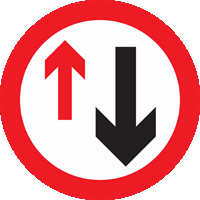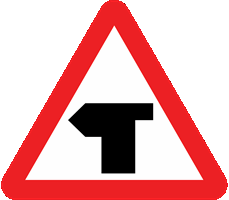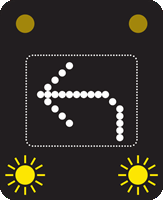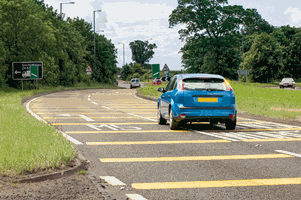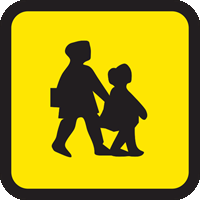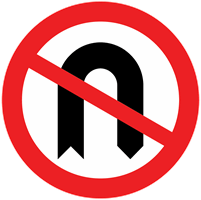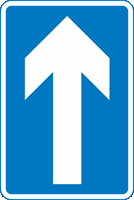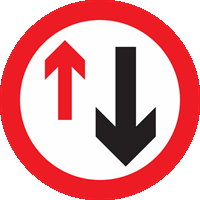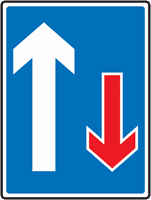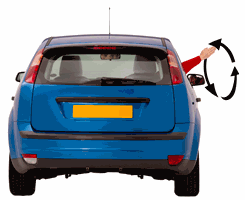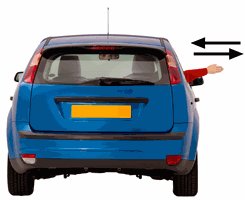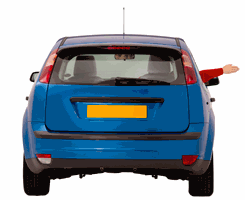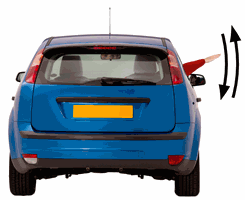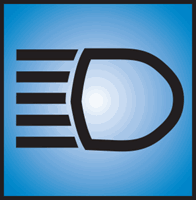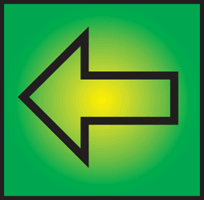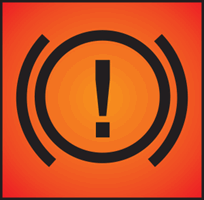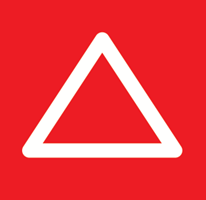You have 57 minutes to answer 50 multiple choice driving theory test questions. You need to answer at least 43 out of 50 questions correctly to pass. You can review your answer after each question or you can review all of your answers at the end of the test. Best of luck!
Test Quick View
Click on an answer to view the correct choice along with the explanation.
1. What's the minimum time gap you should leave when following a vehicle on a wet road? Mark one answer
AB
C
D
Correct Answer: A
Explanation: Water will reduce your tyres' grip on the road. The safe separation gap of at least two seconds in dry conditions should be doubled, to at least four seconds, in wet weather.
Explanation: Water will reduce your tyres' grip on the road. The safe separation gap of at least two seconds in dry conditions should be doubled, to at least four seconds, in wet weather.
2. On a road where trams operate, which of these vehicles will be most at risk from the tram rails? Mark one answer
AB
C
D
Correct Answer: C
Explanation: The narrow wheels of a bicycle can become stuck in the tram rails, causing the cyclist to stop suddenly, wobble or even lose balance altogether. The tram lines are also slippery, which could cause a cyclist to slide or fall off.
Explanation: The narrow wheels of a bicycle can become stuck in the tram rails, causing the cyclist to stop suddenly, wobble or even lose balance altogether. The tram lines are also slippery, which could cause a cyclist to slide or fall off.
3. You intend to turn right into a side road. Why should you check for motorcyclists just before turning? Mark one answer
AB
C
D
Correct Answer: D
Explanation: Never attempt to change direction to the right without first checking your right-hand mirror and blind spot. A motorcyclist might not have seen your signal and could be hidden by other traffic. This observation should become a matter of routine.
Explanation: Never attempt to change direction to the right without first checking your right-hand mirror and blind spot. A motorcyclist might not have seen your signal and could be hidden by other traffic. This observation should become a matter of routine.
Correct Answer: A
Explanation: Toucan crossings are shared by pedestrians and cyclists, who are permitted to cycle across. They're shown the green light together. The signals are push-button-operated and there's no flashing amber phase.
Explanation: Toucan crossings are shared by pedestrians and cyclists, who are permitted to cycle across. They're shown the green light together. The signals are push-button-operated and there's no flashing amber phase.
Correct Answer: A
Explanation: Don't pass cyclists too closely, as they may
-need to veer around a pothole or other obstacle
-be buffeted by side wind
-be made unsteady by your vehicle.
Always leave as much room as you would for a car, and don't cut in front of them.
Explanation: Don't pass cyclists too closely, as they may
-need to veer around a pothole or other obstacle
-be buffeted by side wind
-be made unsteady by your vehicle.
Always leave as much room as you would for a car, and don't cut in front of them.
Correct Answer: A
Explanation: Motorcycles and scooters are generally smaller than other vehicles and can be difficult to see. Wearing bright clothing makes it easier for other road users to see a motorcyclist approaching, especially at junctions.
Explanation: Motorcycles and scooters are generally smaller than other vehicles and can be difficult to see. Wearing bright clothing makes it easier for other road users to see a motorcyclist approaching, especially at junctions.
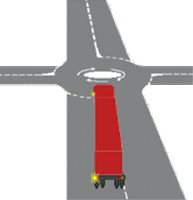
B
C
D
Correct Answer: B
Explanation: At mini-roundabouts, there isn't much room for a long vehicle to manoeuvre. It will have to swing out wide so that it can complete the turn safely. Keep well back and don't try to move up alongside it.
Explanation: At mini-roundabouts, there isn't much room for a long vehicle to manoeuvre. It will have to swing out wide so that it can complete the turn safely. Keep well back and don't try to move up alongside it.
8. You see street lights but no speed-limit signs. What will the speed limit usually be? Mark one answer
AB
C
D
Correct Answer: A
Explanation: The presence of street lights generally indicates that there's a 30 mph speed limit, unless signs tell you otherwise.
Explanation: The presence of street lights generally indicates that there's a 30 mph speed limit, unless signs tell you otherwise.
Correct Answer: A
Explanation: Priority signs are normally shown where the road is narrow and there isn't enough room for two vehicles to pass. Examples are narrow bridges, roadworks and where there's a width restriction. Make sure you know who has priority; don't force your way through. Show courtesy and consideration to other road users.
Explanation: Priority signs are normally shown where the road is narrow and there isn't enough room for two vehicles to pass. Examples are narrow bridges, roadworks and where there's a width restriction. Make sure you know who has priority; don't force your way through. Show courtesy and consideration to other road users.
Correct Answer: C
Explanation: This type of sign warns you of hazards ahead. Make sure you look at each sign and road marking that you pass, so that you don't miss any vital instructions or information. This particular sign shows there's a T-junction with priority over vehicles from the right.
Explanation: This type of sign warns you of hazards ahead. Make sure you look at each sign and road marking that you pass, so that you don't miss any vital instructions or information. This particular sign shows there's a T-junction with priority over vehicles from the right.
Correct Answer: B
Explanation: At night or in poor visibility, reflective studs on the road help you to judge your position on the carriageway.
Explanation: At night or in poor visibility, reflective studs on the road help you to judge your position on the carriageway.
Correct Answer: B
Explanation: You'll see this sign if the motorway is closed ahead. Pull into the left-hand lane as soon as it's safe to do so. Don't wait until the last moment before you move across, because the lane may be busy and you'll have to rely on another driver making room for you.
Explanation: You'll see this sign if the motorway is closed ahead. Pull into the left-hand lane as soon as it's safe to do so. Don't wait until the last moment before you move across, because the lane may be busy and you'll have to rely on another driver making room for you.
Correct Answer: A
Explanation: A rumble device consists of raised markings or strips across the road, designed to give drivers an audible, visual and tactile warning. These devices are used in various locations, including in the line separating the hard shoulder and the left-hand lane on the motorway and on the approach to some hazards, to alert drivers to the need to slow down.
Explanation: A rumble device consists of raised markings or strips across the road, designed to give drivers an audible, visual and tactile warning. These devices are used in various locations, including in the line separating the hard shoulder and the left-hand lane on the motorway and on the approach to some hazards, to alert drivers to the need to slow down.
Correct Answer: A
Explanation: Practise good observation in all directions before you emerge or make a turn. Proceed only when you're sure it's safe to do so.
Explanation: Practise good observation in all directions before you emerge or make a turn. Proceed only when you're sure it's safe to do so.
Correct Answer: B
Explanation: You mustn't use hazard warning lights while moving, except to warn traffic behind when you slow suddenly on a motorway or unrestricted dual carriageway. Never use hazard warning lights to excuse dangerous or illegal parking.
Explanation: You mustn't use hazard warning lights while moving, except to warn traffic behind when you slow suddenly on a motorway or unrestricted dual carriageway. Never use hazard warning lights to excuse dangerous or illegal parking.
Correct Answer: D
Explanation: Before pulling up, check the mirrors to see what's happening behind you. Also assess what's ahead and make sure you give the correct signal if it will help other road users.
Explanation: Before pulling up, check the mirrors to see what's happening behind you. Also assess what's ahead and make sure you give the correct signal if it will help other road users.
17. Powered vehicles used by disabled people are small and hard to see. How do they give early warning when on a dual carriageway? Mark one answer
AB
C
D
Correct Answer: A
Explanation: Powered vehicles used by disabled people are small, low, hard to see and travel very slowly. On a dual carriageway, a flashing amber light will warn other road users.
Explanation: Powered vehicles used by disabled people are small, low, hard to see and travel very slowly. On a dual carriageway, a flashing amber light will warn other road users.
A
B
C
D
B
C
D
Correct Answer: D
Explanation: If you accumulate six or more penalty points within two years of gaining your first full licence it will be revoked. The six or more points include any gained due to offences you committed before passing your test. If this happens you may only drive as a learner until you pass both the theory and practical tests again.
Explanation: If you accumulate six or more penalty points within two years of gaining your first full licence it will be revoked. The six or more points include any gained due to offences you committed before passing your test. If this happens you may only drive as a learner until you pass both the theory and practical tests again.
Correct Answer: A
Explanation: If you see that parts of the tread on your tyres are wearing before others, it may indicate a brake, steering or suspension fault. Regular servicing will help to detect faults at an early stage and this will avoid the risk of minor faults becoming serious or even dangerous.
Explanation: If you see that parts of the tread on your tyres are wearing before others, it may indicate a brake, steering or suspension fault. Regular servicing will help to detect faults at an early stage and this will avoid the risk of minor faults becoming serious or even dangerous.
Correct Answer: D
Explanation: In windy conditions, care must be taken on exposed roads. A strong gust of wind can blow you off course. Watch out for other road users who are particularly likely to be affected, such as cyclists, motorcyclists, high-sided lorries and vehicles towing trailers.
Explanation: In windy conditions, care must be taken on exposed roads. A strong gust of wind can blow you off course. Watch out for other road users who are particularly likely to be affected, such as cyclists, motorcyclists, high-sided lorries and vehicles towing trailers.
Correct Answer: C
Explanation: Buses which carry children to and from school may stop at places other than scheduled bus stops. Be aware that they might pull over at any time to allow children to get on or off. This will normally be when traffic is heavy during rush hour.
Explanation: Buses which carry children to and from school may stop at places other than scheduled bus stops. Be aware that they might pull over at any time to allow children to get on or off. This will normally be when traffic is heavy during rush hour.
22. What should you do when you're following a motorcyclist along a road that has a poor surface? Mark one answer
AB
C
D
Correct Answer: A
Explanation: To avoid being unbalanced, a motorcyclist might swerve to avoid potholes and bumps in the road. Be prepared for this and allow them extra space.
Explanation: To avoid being unbalanced, a motorcyclist might swerve to avoid potholes and bumps in the road. Be prepared for this and allow them extra space.
Correct Answer: C
Explanation: When you're following a long vehicle, stay well back so that you can get a better view of the road ahead. The closer you get, the less you'll be able to see of the road. Be patient and don't take a gamble. Only overtake when you're certain that you can complete the manoeuvre safely.
Explanation: When you're following a long vehicle, stay well back so that you can get a better view of the road ahead. The closer you get, the less you'll be able to see of the road. Be patient and don't take a gamble. Only overtake when you're certain that you can complete the manoeuvre safely.
Correct Answer: A
Explanation: Trams may run on roads used by other vehicles and pedestrians. The section of road used by trams is known as the reserved area and should be kept clear. It usually has a different surface, edged with white lane markings.
Explanation: Trams may run on roads used by other vehicles and pedestrians. The section of road used by trams is known as the reserved area and should be kept clear. It usually has a different surface, edged with white lane markings.
Correct Answer: A
Explanation: Stay in the left-hand lane long enough to get used to the higher speeds of motorway traffic before considering overtaking.
Explanation: Stay in the left-hand lane long enough to get used to the higher speeds of motorway traffic before considering overtaking.
26. You're on a well-lit road at night, in a built-up area. How will using dipped headlights help? Mark one answer
AB
C
D
Correct Answer: A
Explanation: You may be difficult to see when you're travelling at night, even on a well-lit road. If you use dipped headlights rather than sidelights, other road users should be able to see you more easily.
Explanation: You may be difficult to see when you're travelling at night, even on a well-lit road. If you use dipped headlights rather than sidelights, other road users should be able to see you more easily.
27. An injured person has been placed in the recovery position. They're unconscious but breathing normally. What else should be done? Mark one answer
AB
C
D
Correct Answer: A
Explanation: After a casualty has been placed in the recovery position, make sure their airway remains open and monitor their condition until medical help arrives. Where possible, don't move a casualty unless there's further danger.
Explanation: After a casualty has been placed in the recovery position, make sure their airway remains open and monitor their condition until medical help arrives. Where possible, don't move a casualty unless there's further danger.
Correct Answer: B
Explanation: If the road has two lanes, you can use either lane and overtake on either side. Use the lane that's more convenient for your destination unless signs or road markings indicate otherwise.
Explanation: If the road has two lanes, you can use either lane and overtake on either side. Use the lane that's more convenient for your destination unless signs or road markings indicate otherwise.
A
B
C
D
B
C
D
Correct Answer: D
Explanation: There may be occasions when drivers need to give an arm signal to confirm their intentions. This could include in bright sunshine, at a complex road layout, when stopping at a pedestrian crossing or when turning right just after passing a parked vehicle. You should understand what each arm signal means. If you give arm signals, make them clear, correct and decisive.
Explanation: There may be occasions when drivers need to give an arm signal to confirm their intentions. This could include in bright sunshine, at a complex road layout, when stopping at a pedestrian crossing or when turning right just after passing a parked vehicle. You should understand what each arm signal means. If you give arm signals, make them clear, correct and decisive.
30. You're on a good, dry road surface. Your brakes and tyres are good. What's the typical overall stopping distance at 40 mph? Mark one answer
AB
C
D
Correct Answer: B
Explanation: Stopping distances are affected by a number of variables. These include the type, model and condition of your vehicle, the road and weather conditions, and your reaction time. Look well ahead for hazards and leave enough space between you and the vehicle in front. This should allow you to pull up safely if you have to, without braking sharply.
Explanation: Stopping distances are affected by a number of variables. These include the type, model and condition of your vehicle, the road and weather conditions, and your reaction time. Look well ahead for hazards and leave enough space between you and the vehicle in front. This should allow you to pull up safely if you have to, without braking sharply.
31. A casualty has an injured arm. They can move it freely but it's bleeding. Why should you get them to keep it in a raised position? Mark one answer
AB
C
D
Correct Answer: C
Explanation: If a casualty is bleeding heavily, raise the limb to a higher position. This will help to reduce the blood flow. Before raising the limb, you should make sure that it isn't broken.
Explanation: If a casualty is bleeding heavily, raise the limb to a higher position. This will help to reduce the blood flow. Before raising the limb, you should make sure that it isn't broken.
32. There's a bus lane on your left. The signs show no times of operation. What does this mean? Mark one answer

B
C
D
Correct Answer: A
Explanation: Bus-lane signs show the vehicles allowed to use the lane and also its times of operation. Where no times are shown, the bus lane is in operation 24 hours a day.
Explanation: Bus-lane signs show the vehicles allowed to use the lane and also its times of operation. Where no times are shown, the bus lane is in operation 24 hours a day.
33. You're driving in freezing conditions. What should you do when approaching a sharp bend? Mark one answer
AB
C
D
Correct Answer: D
Explanation: Harsh use of the accelerator, brakes or steering is likely to lead to skidding, especially on slippery surfaces. Avoid steering and braking at the same time. In icy conditions it's very important that you constantly assess what's ahead, so that you can take appropriate action in plenty of time.
Explanation: Harsh use of the accelerator, brakes or steering is likely to lead to skidding, especially on slippery surfaces. Avoid steering and braking at the same time. In icy conditions it's very important that you constantly assess what's ahead, so that you can take appropriate action in plenty of time.
34. You're driving at night and are dazzled by vehicle headlights coming towards you. What should you do? Mark one answer
AB
C
D
Correct Answer: D
Explanation: If the headlights of an oncoming vehicle dazzle you, slow down or, if necessary, stop. Don't close your eyes or swerve, as you'll increase your chances of having a collision. Don't flash your headlights either, as this could dazzle other drivers and make the situation worse.
Explanation: If the headlights of an oncoming vehicle dazzle you, slow down or, if necessary, stop. Don't close your eyes or swerve, as you'll increase your chances of having a collision. Don't flash your headlights either, as this could dazzle other drivers and make the situation worse.
35. You're driving on a motorway. By mistake, you go past the exit that you wanted to take. What should you do? Mark one answer
AB
C
D
Correct Answer: C
Explanation: It's illegal to reverse, cross the central reservation or drive against the traffic flow on a motorway. If you miss your exit, carry on until you reach the next one. Ask yourself why you missed your exit - if you think that your concentration is fading, take a break before completing your journey.
Explanation: It's illegal to reverse, cross the central reservation or drive against the traffic flow on a motorway. If you miss your exit, carry on until you reach the next one. Ask yourself why you missed your exit - if you think that your concentration is fading, take a break before completing your journey.
36. You want to park and you see this sign. What should you do on the days and times shown? Mark one answer
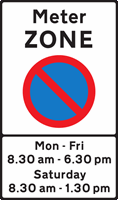
B
C
D
Correct Answer: B
Explanation: Parking restrictions apply in a variety of places and situations. Make sure you know the rules and understand where and when restrictions apply. Controlled parking areas will be indicated by signs and road markings. Parking in the wrong place could cause an obstruction and danger to other traffic. It can also result in a fine.
Explanation: Parking restrictions apply in a variety of places and situations. Make sure you know the rules and understand where and when restrictions apply. Controlled parking areas will be indicated by signs and road markings. Parking in the wrong place could cause an obstruction and danger to other traffic. It can also result in a fine.
Correct Answer: B
Explanation: You mustn't reverse further than is necessary. You may decide to turn your vehicle around by reversing into an opening or side road. When you reverse, always look all around you, and watch for pedestrians. Don't reverse from a side road into a main road.
Explanation: You mustn't reverse further than is necessary. You may decide to turn your vehicle around by reversing into an opening or side road. When you reverse, always look all around you, and watch for pedestrians. Don't reverse from a side road into a main road.
Correct Answer: B
Explanation: Don't reverse into a main road from a side road. The main road is likely to be busy and the traffic on it moving quickly.
Explanation: Don't reverse into a main road from a side road. The main road is likely to be busy and the traffic on it moving quickly.
Correct Answer: C
Explanation: Poor contact with the road surface could cause one or more of the tyres to lose grip on the road. This is more likely to happen when braking in poor weather conditions and when the road has a loose, slippery or uneven surface.
Explanation: Poor contact with the road surface could cause one or more of the tyres to lose grip on the road. This is more likely to happen when braking in poor weather conditions and when the road has a loose, slippery or uneven surface.
40. You want to turn right at a box junction. There's oncoming traffic. What should you do? Mark one answer
AB
C
D
Correct Answer: D
Explanation: You can wait in the box junction as long as your exit is clear. At some point there'll be a gap in the oncoming traffic, or the traffic lights will change, allowing you to proceed.
Explanation: You can wait in the box junction as long as your exit is clear. At some point there'll be a gap in the oncoming traffic, or the traffic lights will change, allowing you to proceed.
Correct Answer: C
Explanation: Having your car registration number etched on all your windows is a cheap and effective way to deter professional car thieves.
Explanation: Having your car registration number etched on all your windows is a cheap and effective way to deter professional car thieves.
Correct Answer: A
Explanation: Third party insurance doesn't cover damage to your own vehicle or injury to yourself. If you have a crash and your vehicle is damaged you might have to carry out the repairs at your own expense.
Explanation: Third party insurance doesn't cover damage to your own vehicle or injury to yourself. If you have a crash and your vehicle is damaged you might have to carry out the repairs at your own expense.
Correct Answer: A
Explanation: The licensing authority needs to keep its records up to date. It sends out a reminder when a vehicle's excise licence (road tax) is due for renewal. To do this, it needs to know the name and address of the registered keeper. Every vehicle in the country is registered, so it's possible to trace its history.
Explanation: The licensing authority needs to keep its records up to date. It sends out a reminder when a vehicle's excise licence (road tax) is due for renewal. To do this, it needs to know the name and address of the registered keeper. Every vehicle in the country is registered, so it's possible to trace its history.
Correct Answer: A
Explanation: You should take extra care when you first encounter trams. You'll have to get used to dealing with a different traffic system. Be aware that trams can accelerate and travel very quickly, and they can't change direction to avoid obstructions.
Explanation: You should take extra care when you first encounter trams. You'll have to get used to dealing with a different traffic system. Be aware that trams can accelerate and travel very quickly, and they can't change direction to avoid obstructions.
45. Which instrument-panel warning light would show that headlights are on full beam? Mark one answer
AB
C
D
Correct Answer: A
Explanation: You should be aware of all the warning lights and visual aids on the vehicle you're driving. If you're driving a vehicle for the first time, you should familiarise yourself with all the controls, warning lights and visual aids before you set off.
Explanation: You should be aware of all the warning lights and visual aids on the vehicle you're driving. If you're driving a vehicle for the first time, you should familiarise yourself with all the controls, warning lights and visual aids before you set off.
Correct Answer: B
Explanation: When learning to drive, it's a good idea to practise filling your car with fuel. Ask your instructor if you can use a petrol station and fill the fuel tank yourself. You need to know where the filler cap is on the car you're driving, so you know which side of the pump to park at. Take care not to overfill the tank and make sure you secure the filler cap correctly, so that no fuel leaks onto the road while you're driving.
Explanation: When learning to drive, it's a good idea to practise filling your car with fuel. Ask your instructor if you can use a petrol station and fill the fuel tank yourself. You need to know where the filler cap is on the car you're driving, so you know which side of the pump to park at. Take care not to overfill the tank and make sure you secure the filler cap correctly, so that no fuel leaks onto the road while you're driving.

B
C
D
Correct Answer: D
Explanation: Allow the traffic to merge into the left-hand lane. Leave enough room so that you can maintain a safe separation distance, even if vehicles pull in ahead of you.
Explanation: Allow the traffic to merge into the left-hand lane. Leave enough room so that you can maintain a safe separation distance, even if vehicles pull in ahead of you.
Correct Answer: A
Explanation: Riding in a towed caravan is highly dangerous. The safety of the entire unit is dependent on the stability of the trailer. Moving passengers would make the caravan unstable and could cause loss of control.
Explanation: Riding in a towed caravan is highly dangerous. The safety of the entire unit is dependent on the stability of the trailer. Moving passengers would make the caravan unstable and could cause loss of control.
A
B
C
D
B
C
D
Correct Answer: B
Explanation: It's illegal to fit a rear-facing baby seat into a passenger seat protected by an active frontal airbag. If the airbag activates, it could cause serious injury or even death to the child. You must secure it in a different seat or deactivate the relevant airbag. Follow the manufacturer's advice when fitting a baby seat.
Explanation: It's illegal to fit a rear-facing baby seat into a passenger seat protected by an active frontal airbag. If the airbag activates, it could cause serious injury or even death to the child. You must secure it in a different seat or deactivate the relevant airbag. Follow the manufacturer's advice when fitting a baby seat.
50. Your vehicle has broken down on an automatic railway level crossing. What should you do first? Mark one answer
AB
C
D
Correct Answer: A
Explanation: First, get yourself and anyone else well away from the crossing. If there's a railway telephone, use that to get instructions from the signal operator. Then, if there's time, move the vehicle clear of the crossing.
Explanation: First, get yourself and anyone else well away from the crossing. If there's a railway telephone, use that to get instructions from the signal operator. Then, if there's time, move the vehicle clear of the crossing.



